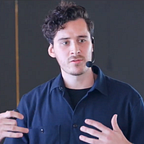A Crucial Principle for Turning the Tide: The Story of Cukie, the Stubborn Cucumber
Discover the main force preventing organisational change
A few months ago I was having a ‘deep’ work-related conversation with a good colleague of mine, Jack. We were both consultants for a mid-sized airport in the Netherlands, where Jack had been leading a major change project for over three years. He was hard-working, well-respected, and absolutely dedicated to finishing the project in the very near future.
“I know that I’ve been able to change quite some things around here”, Jack said. “But to be brutally honest with you: it feels like the impact I’m making, is far from what it used to be.”
I listened and looked at him. Jack knew every single person working at the airport. He had adopted their accent. He had been offered a job there. Basically, he was one of them…
So how come Jack didn’t feel effective anymore?
Suddenly I remembered a great analogy:
The story of Cukie, the Stubborn Cucumber.
It was autumn, 1613, late in the evening. An icy breeze blew through the port of Amsterdam and a young apprentice at a medium-sized pickle shop was about to close down the store.
For the Dutch, the salt trade had laid a strong foundation to build their wealth and power, resulting in them dominating the seas for over 300 years. They established colonies, monopolized the spice trade and went to extreme lengths to keep it that way (seriously, a dark page in our history).
It was the same salt our apprentice used for pickling.
The pickle apprentice was exhausted from a hard day’s work- he had been brining cucumbers for 11 hours straight. Thinking about his beautiful girlfriend, who would be waiting for him at home, he picked up his last cucumber for the day and indifferently threw it in the barrel of brine. He grabbed his coat, closed the door, and left.
Little did the apprentice know that exactly that last cucumber was Cukie- the stubbornest of them all…
With a gentle splash, Cukie entered the brine. Sinking to the bottom, he looked around and saw the other cucumbers. They all looked the same... He was perplexed, angry, sickened by what had happened to them!
“What’s the matter with you guys? Have you no pride? What self-respecting cucumber would let himself get pickled without putting up a fight?”
It remained quite silent in the barrel of brine. After a moment, a small, wriggled, barely-cucumber close to Cukie slowly turned around. “But what can we do?”
“You can resist, my fellas. That’s what you can do. That’s what I’m gonna do. As long as I am Cukie, no brine will affect me!”
The next day and every day after, the apprentice would return and work as hard as he could. Then, sometime later, his boss died and the pickle shop became his. Dancing between the barrels with his girlfriend, they got very inspired and decided to try something new: “Don’t you think our pickles could go well with brined herring?”
If you’ve ever been to Amsterdam, you know the rest is history. Until this day, almost 500 years later, their fish-and-pickle combination is a popular street snack in many of the port cities- and has arguably become part of Dutch culture.
Now, you might be wondering: “Wait, this story was about Cukie the stubborn cucumber! What happened to him?”
Of course you know what happened to him.
We all know what happened to him:
If you stay in the brine long enough, you become a pickle.
Outsiders wanting to ignite change should always remember:
Cucumbers get more pickled than brine gets cucumbered.
Or in practical wording, by the guy that came up with this pickle principle:
A small system that tries to change a big system through long and continued contact, is more likely to be changed itself — Gerald M. Weinberg
When we’re entering big organisations as outsiders, we are optimistic but also vulnerable cucumbers. And we’re diving straight into the big, stable brine of the company’s way: its culture, its routines. And its flaws.
That’s why the anthropologist goes native and the psychiatrist goes crazy. No matter how smart, strong-minded or stubborn: as consultants or staff members spending too much time in the brine, we lose our effectiveness at igniting change. We get pickled. We are the ones who change- and we get stuck.
This is where Jack was at. Change generally takes both time and continued contact- it’s what had made Jack effective in the first place. But now, he had simply been working for the same client for too long. He had become a pickle. It was time to break up.
For his next project, Jack should avoid getting pickled. He could break up his week, work with other clients, even if it were for free. Moreover, the challenge then would become more interesting:
How to get the client in long, continued contact with some kind of brine.
Without Jack ever being present.
You’ve probably been pickled before... How did it affect your work? I am curious to hear!
T.O.
P.S. in academic strategic management, the force preventing change in (successful) organisations is known as inertia. Overcoming inertia is challenging and gives a major incentive for organisations to hire outsiders, build partnerships or acquire young companies.
Assuming, of course, those will not be pickled be their brine.
Want to learn more? This HBR article is a great start.
Thank you, Gerald M. Weinberg, for providing a strong basis for this story and its insights with Prescott’s Pickle Principle, in The Secrets of Consulting.
